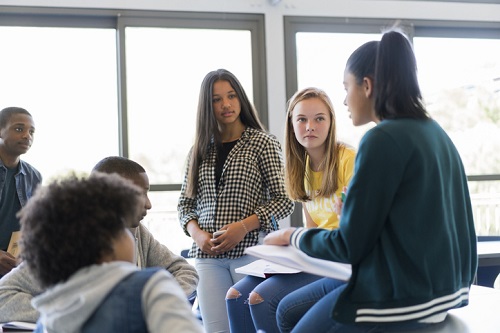
In schools across Australia, the teaching of civics and citizenship is promoting students’ participation in democracy by helping them to understand their rights and responsibilities as active and informed citizens.
However, Australia’s Constitution provides only limited rights protections rather than the prestigious Bill of Rights enshrined in the US Constitution.
According to a report by the Museum of Australian Democracy and the Institute for Governance and Policy Analysis at the University of Canberra, satisfaction with the way democracy works in Australia has fallen significantly over the last decade.
In 2007, 86% of voters were satisfied with Australia’s democracy, but that figure dropped to 72% by 2010 and then went into freefall from 2013, plummeting from 72% to 41% between 2013 and 2018.
And this week, journalists across Australia expressed shock and concern after the AFP raided the home of News Corp journalist Annika Smethurst who reported a story about a secret government plan to spy on Australians.
One day later, a second raid was launched on the Sydney headquarters of the ABC, which had published a story in 2017 about Australian troops allegedly killing unarmed men and children in Afghanistan.
Concerns over freedom of press
The ABC managing director, David Anderson, said the raid was “highly unusual” and “raises legitimate concerns over freedom of the press”.
Rebecca Ananian-Welsh, a senior lecturer at the University of Queensland TC Beirne School of Law, said raids like these mean that sources will be less likely to come forward, facing risk to themselves and a high likelihood of identification by government agencies.
“Additionally, journalists are less likely to run stories, knowing the risks posed to their sources and perhaps even to themselves,” Ananian-Welsh wrote in the Conversation.
Speaking to Patricia Karvelas on ABC Radio Melbourne's Mornings program, Walkley Foundation chair and long-time presenter of the ABC's 7.30 program Kerry O'Brien, also expressed deep concerns about the implications of the raids.
“If people care about democracy, this does go to the heart of democracy and the democratic process,” O’Brien said.
So, what does all of this mean for civics and citizenship educators who are teaching young people about what kind of democracy to expect once they leave school?
These trends and events trend have led some educators to urge greater education of democracy in schools across the nation. One of them is Dr Stewart Riddle, a senior lecturer in the University of Southern Queensland’s (USQ) School of Education.
On 31 May, Dr Riddle published a book, titled: ‘Re-imagining Education for Democracy’, which takes up the “unfinished project of resisting the de-democratisation of education and growing levels of social and educational inequality”.
According to Riddle, principals have a critical role to play in redefining schools and formal education as being ‘for’ democracy.
“That is because they have significant influence over the policy structures, pedagogical approaches and school cultures within which they work,” Riddle told The Educator.
“Of course, it isn’t an easy proposition, because our institutions and systems are set up in such a way to both self-legitimise and maintain their power and structures, but I think it’s clear that our structures and institutions – of which schools, universities and other sites of formal learning are certainly part – do need changing.”
Riddle says society has been beholden to a logic that “valorises competition and individual gain above all else” for too long.
“If we are to have any hope, we need to collaborate and work collectively and democratically to address the global crises we’re facing,” he said.
“That’s why education is so important, because it’s not just a foundation for a skilled labour force, but also a societal incubator – and within schools, principals wield enormous power to enact and support change.”
Students are speaking truth to power
“The school climate strikes, and young people like Swedish schoolgirl activist Greta Thunberg, are perfect examples of children and young people who aren’t allowed to drive or vote, taking their collective voices and political will for action directly to governments, big business and the media,” Riddle said.
Riddle says that despite the downsides of social media and its effects, one positive is that it provides a certain kind of “digital civic participation” that brings young people from all over the world together to fight for the causes in which they believe.
However, he doesn’t see much evidence of Australian schools doing anything to adapt or support this reality.
“In fact, our political leaders are publicly denigrating not only these young activists, but also their teachers for allegedly putting these ideas in their heads,” he said.
“I wish that this were the case, but I’m yet to see any significant evidence that it is more than young people themselves choosing to act.
“Of course, there are teachers who are passionately engaged in political activism and social causes, but I’m talking here about education systems, school structures and curriculum, which are inherently set against producing these kinds of outcomes. And that, I believe, is what needs to change.”


